

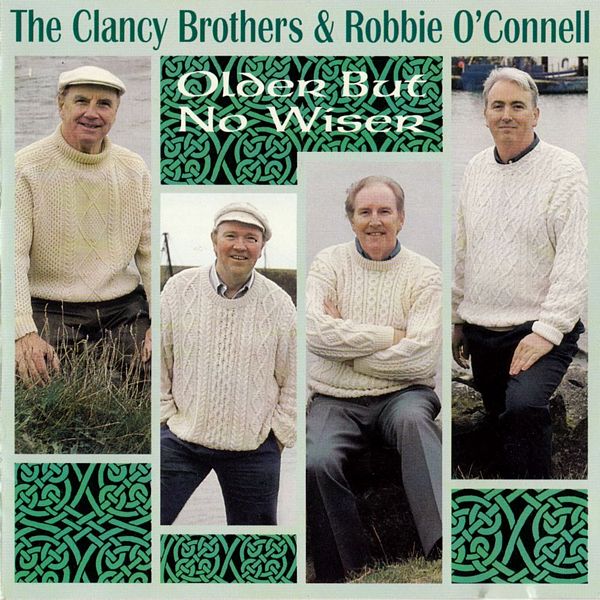 |
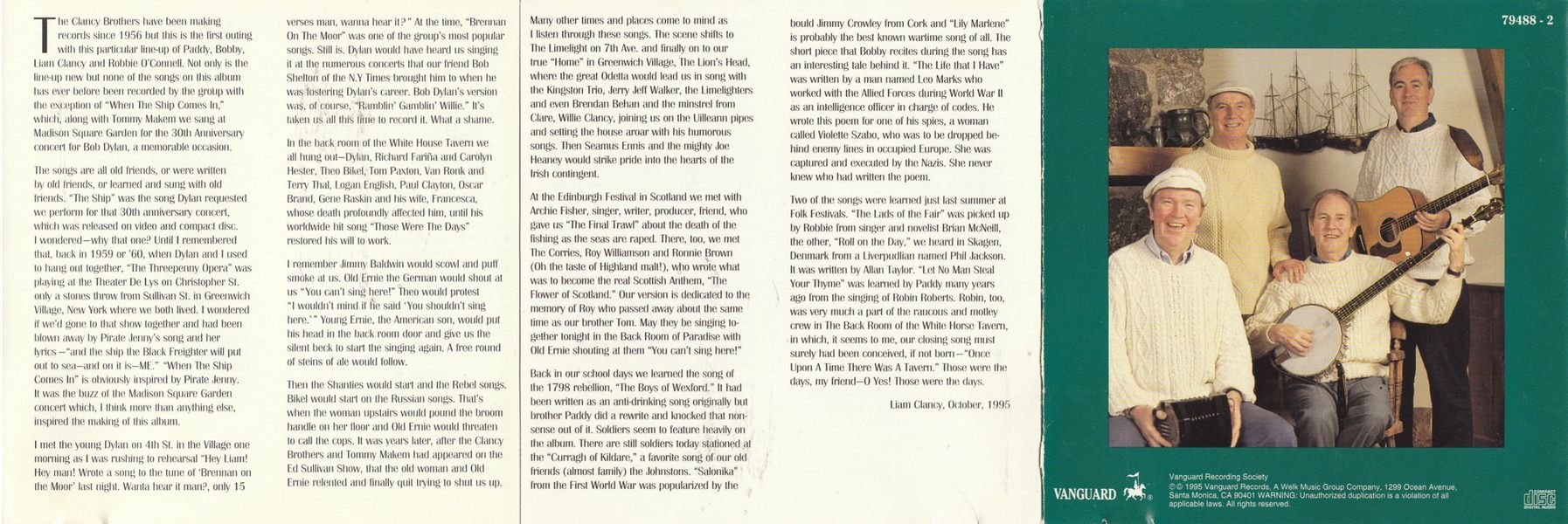
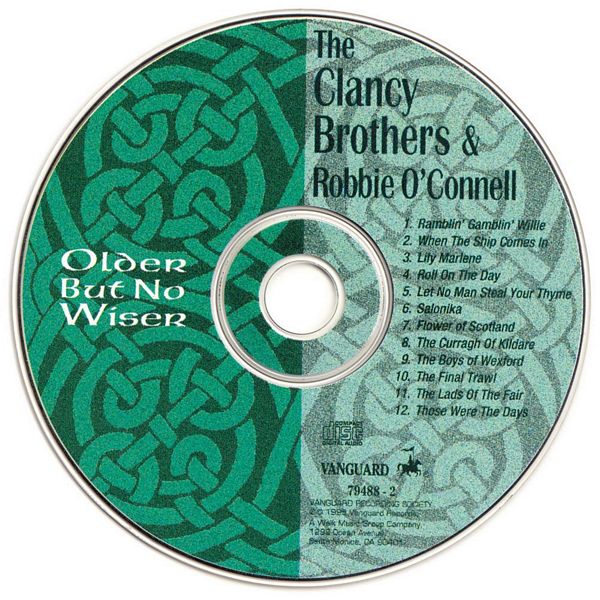 |
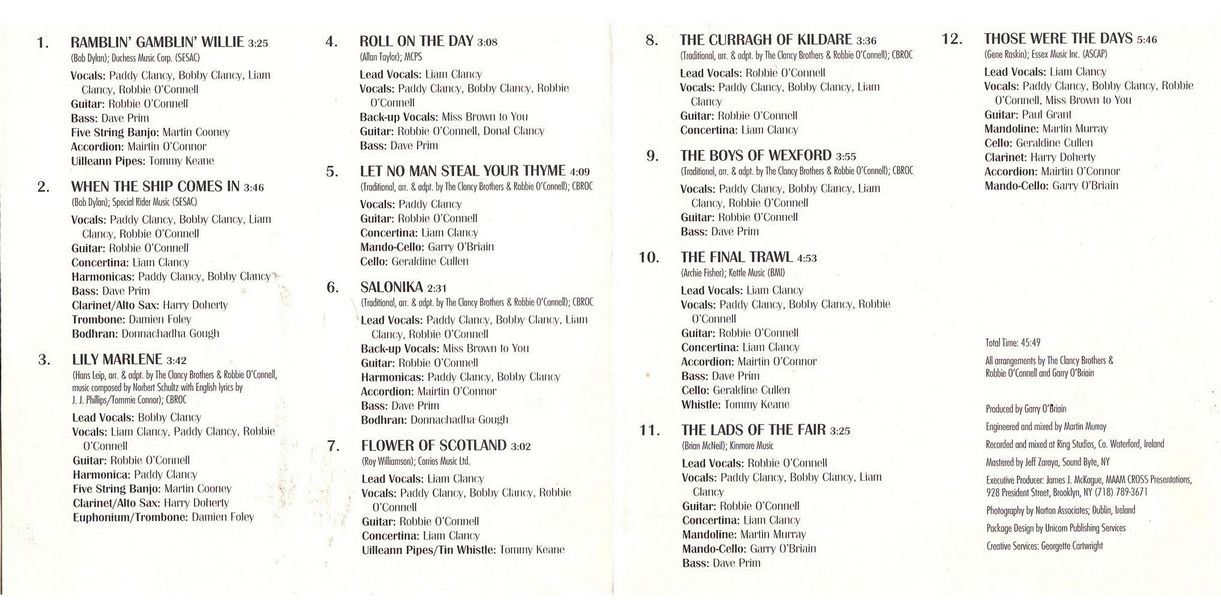
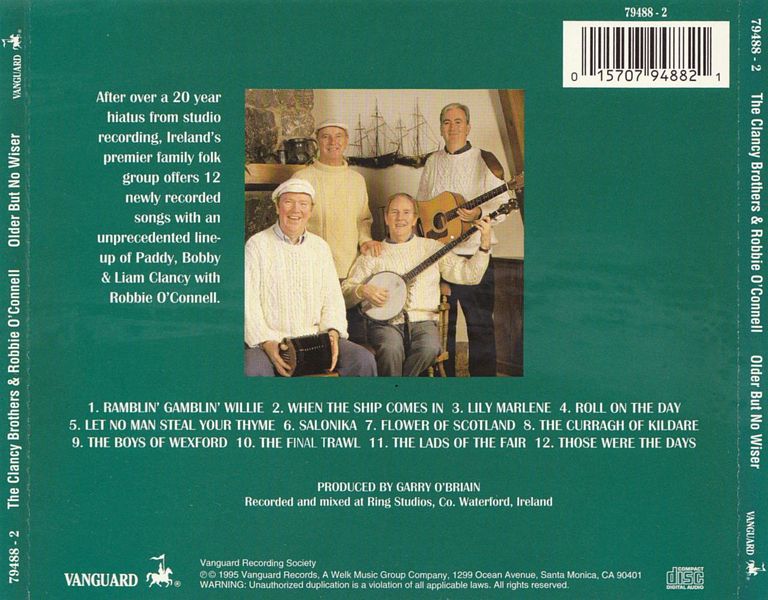 |
Sleeve Notes
The Clancy Brothers have been making records since 1956 but this is the first outing with this particular line-up of Paddy, Bobby, Liam Clancy and Robbie O'Connell. Not only is the line-up new but none of the songs on this album has ever before been recorded by the group with the exception of "When The Ship Comes In," which, along with Tommy Makem we sang at Madison Square Garden for the 30th Anniversary concert for Bob Dylan, a memorable occasion.
The songs are all old friends, or were written by old friends, or learned and sung with old friends. "The Ship" was the song Dylan requested we perform for that 30th anniversary concert, which was released on video and compact disc. I wondered — why that one? Until I remembered that, back in 1959 or '60, when Dylan and I used to hang out together, "The Threepenny Opera" was playing at the Theater De Lys on Christopher St. only a stones throw from Sullivan St. in Greenwich Village, New York where we both lived. I wondered if we'd gone to that show together and had been blown away by Pirate Jenny's song and her lyrics — "and the ship the Black Freighter will put out to sea — and on it is — ME." "When The Ship Comes In" is obviously inspired by Pirate Jenny. It was the buzz of the Madison Square Garden concert which, I think more than anything else, inspired the making of this album.
I met the young Dylan on 4th St. in the Village one morning as I was rushing to rehearsal "Hey Liam! Hey man! Wrote a song to the tune of 'Brennan on the Moor' last night. Wanta hear it man?, only 15 verses man, wanna hear it?" At the time, "Brennan On The Moor" was one of the group's most popular songs. Still is. Dylan would have heard us singing it at the numerous concerts that our friend Bob Shelton of the N.Y Times brought him to when he was fostering Dylan's career. Bob Dylan's version was, of course, "Ramblin' Gamblin' Willie." It's taken us all this time to record it. What a shame.
In the back room of the White House Tavern we all hung out — Dylan, Richard Farina and Carolyn Hester, Theo Bikel, Tom Paxton, Van Ronk and Terry Thal, Logan English, Paul Clayton, Oscar Brand, Gene Raskin and his wife, Francesca, whose death profoundly affected him, until his worldwide hit song "Those Were The Days" restored his will to work.
I remember Jimmy Baldwin would scowl and puff smoke at us. Old Ernie the German would shout at us "You can't sing here!" Theo would protest "I wouldn't mind if he said ‘You shouldn't sing here.’" Young Ernie, the American son, would put his head in the back room door and give us the silent beck to start the singing again. A free round of steins of ale would follow.
Then the Shanties would start and the Rebel songs. Bikel would start on the Russian songs. That's when the woman upstairs would pound the broom handle on her floor and Old Ernie would threaten to call the cops. It was years later, after the Clancy Brothers and Tommy Makem had appeared on the Ed Sullivan Show, that the old woman and Old Ernie relented and finally quit trying to shut us up.
Many other times and places come to mind as I listen through these songs. The scene shifts to The Limelight on 7th Ave. and finally on to our true "Home" in Greenwich Village, The Lion's Head, where the great Odetta would lead us in song with the Kingston Trio, Jerry Jeff Walker, the Limelighters [sic] and even Brendan Behan and the minstrel from Clare, Willie Clancy, joining us on the Uilleann pipes and setting the house aroar with his humorous songs. Then Seamus Ennis and the mighty Joe Heaney would strike pride into the hearts of the Irish contingent.
At the Edinburgh Festival in Scotland we met with Archie Fisher, singer, writer, producer, friend, who gave us "The Final Trawl" about the death of the fishing as the seas are raped. There, too, we met The Corries, Roy Williamson and Ronnie Brown [sic] (Oh the taste of Highland malt!), who wrote what was to become the real Scottish Anthem, "The Flower of Scotland." Our version is dedicated to the memory of Roy who passed away about the same time as our brother Tom. May they be singing together tonight in the Back Room of Paradise with Old Ernie shouting at them "You can't sing here!"
Back in our school days we learned the song of the 1798 rebellion, "The Boys of Wexford." It had been written as an anti-drinking song originally but brother Paddy did a rewrite and knocked that nonsense out of it. Soldiers seem to feature heavily on the album. There are still soldiers today stationed at the "Curragh of Kildare," a favorite song of our old friends (almost family) the Johnstons. "Salonika" from the First World War was popularized by the bould Jimmy Crowley from Cork and "Lily Marlene" is probably the best known wartime song of all. The short piece that Bobby recites during the song has an interesting tale behind it. "The Life that I Have" was written by a man named Leo Marks who worked with the Allied Forces during World War II as an intelligence officer in charge of codes. He wrote this poem for one of his spies, a woman called Violetle Szabo, who was to be dropped behind enemy lines in occupied* Europe. She was captured and executed by the Nazis. She never knew who had written the poem.
Two of the songs were learned just last summer at Folk Festivals. "The Lads of the Fair" was picked up by Robbie from singer and novelist Brian McNeill, the other, "Roll on the Day," we heard in Skagen, Denmark from a Liverpudlian named Phil Jackson. It was written by Allan Taylor. "Let No Man Steal Your Thyme" was learned by Paddy many years ago from the singing of Robin Roberts. Robin, too, was very much a part of the raucous and motley crew in The Back Room of the White Horse Tavern, in which, it seems to me, our closing song must surely had been conceived, if not born — "Once Upon A Time There Was A Tavern." Those were, the days, my friend — O Yes! Those were the days.
Liam Clancy, October, 1995